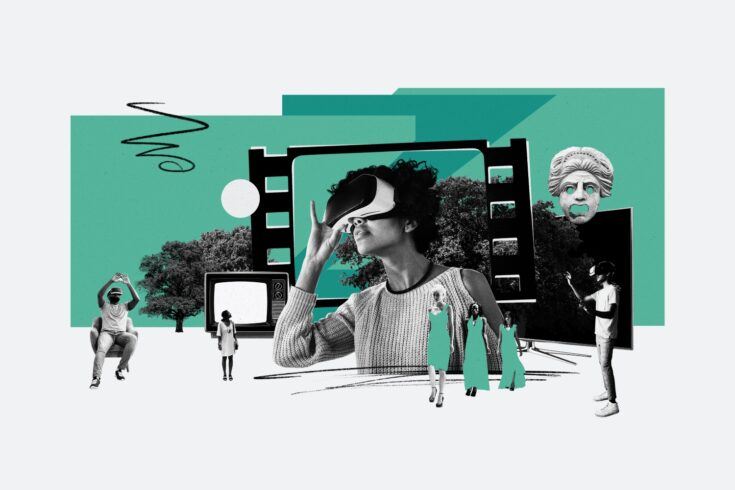It was said that in the Roman Empire, what people wanted was bread and circuses. They wanted to eat and they wanted to be entertained and to share cultural experiences.
We’ve got amazing stories in UK Research and Innovation (UKRI) about bread (look at our food programme!) but we also need to talk about circuses – the cultural environment in which we live is part of our foundation. Everyone needs not just the basics of life. They also need to live that life communally and have things to share and discuss.
As a historian, I look at the way people live together. I look at the rituals they have and the way they engage, and I see deep commonalities.
I see societies that have invested in culture are strong and resilient. It’s what keeps them alive and fresh. There’s a chilling effect when that goes. Totalitarianism tends to have very limited and narrow views on what culture can do, and these are societies that tend not to last very long.
Barbie gets us talking
Here in the UK the creative industries are furnishing us with the national conversation. What did many people do on a weekend in July? They either went to see ‘Barbie’ or ‘Oppenheimer’ at the cinema.
They ended up either having a conversation about gender or a conversation about science and the future of the planet.
Rishi Sunak recently said the creative industries were ‘going like gangbusters’ – they are indeed astonishingly successful in the UK.
They account for something like 6% of the UK economy and are worth more than £100 billion. In recent years the creative industries have generated more value to the economy than the aerospace, life sciences and automotive industries put together.
In the music industry, there’s the US, but then there’s the UK and a gap to the rest. We are one of the world’s publishing powerhouses.
Pinewood will soon be the largest film studio in the world, and we have the highest density of film and television studios in the world. We’ve been a design leader for centuries. Wherever you look, creative industries are outperforming.
Creative industries will lead on artificial intelligence
There are challenges. Competition is strong, so we need to keep performing and innovating.
We must invest in skills. There are jobs out there that we can’t find anybody skilled enough to perform, and there are people with skills who can’t find jobs. There are issues around working culture, including inclusion, bullying and harassment, and around the gig economy. These are things we and industry are working to address.
Artificial intelligence (AI) is also an enormous question hanging over the creative sector, in the same way that it is over many other industries. However, AI is in the DNA of the creative industries, so they will be the ones to take us forward.
It took four years to develop the avatars used in ‘Abba the Musical’. I recently saw somebody dance without any motion capture markers. They were video captured on a mobile phone and that was translated so the person was draped in a totally different dress than the one they had on.
Within two hours, that person was performing in any form you like, including holographically, in the newly rendered clothes. That was thanks to a mobile phone, a massive bit of IT and some very good programming.
That doesn’t mean people are redundant in these productions. It means those people are free to do the next stage of creation. That’s why the creative industries section of Innovate UK’s BridgeAI programme has such promise.
We must invest more in 21st century industries
Arguably, we are underinvesting in these 21st century industries. We need research and development investment in creative industries to rise to be proportionally equivalent to that for other industries.
The government recently launched the creative industries sector vision, which was developed between government and industry. It sets out the ambition to grow the value of creative industries and grow the number of jobs by 2030. It’s a good start.
Creative sector cannot be contained
We are doing great things across all our councils, but we haven’t always joined the dots.
I’ve taken on a new role as UKRI champion for the creative industries sector and this is about coordinating our activity and asking how we can work better together. It’s about fulfilling our potential as an organisation.
I’m really excited about the work our creative clusters are doing, for example on sustainable fashion in Leeds and London. Throwaway fashion creates huge amounts of landfill. We’re developing incredibly efficient and sustainable ways of producing textiles.
I was recently in Belfast at Future Screens Northern Ireland talking to some psychologists who had developed an ocular device that tests the reactions of a rugby player before a game and after they have taken a knock, so they can detect signs of concussion.
They then started thinking, what about things like stroke? What about helping people with dementia? Or checking the progress of disabilities? Checking whether drugs are working? They started to find that so many people wanted to use this.
Creative industries are a combination of technology and creativity. Things spill over whether you like it or not. They just cannot be contained.
We can show that creative industries work for the benefit of everybody in all parts of the country.
Aristophanes created with a moral purpose
The 5th century Athenian comedian Aristophanes makes me laugh every time. Some of what he does is pure slapstick.
However, he was making people think about war, about justice, gender, violence, old age, the absurdity of being at odds with each other in conflict and how to overcome it. He celebrated in almost all his plays the coming together of communities.
He had co-investment from private sponsors, he gave employment to people, and he brought the national conversation to life for everyone.
We’re doing the same. We just happen to be doing it with incredibly advanced technology. Underneath it all, it’s about investing in living together through culture and learning how to be better people.
I believe the creative industries must keep that moral core. It’s not just about making money, it’s not just about technology, it’s also about living together in a better society.




